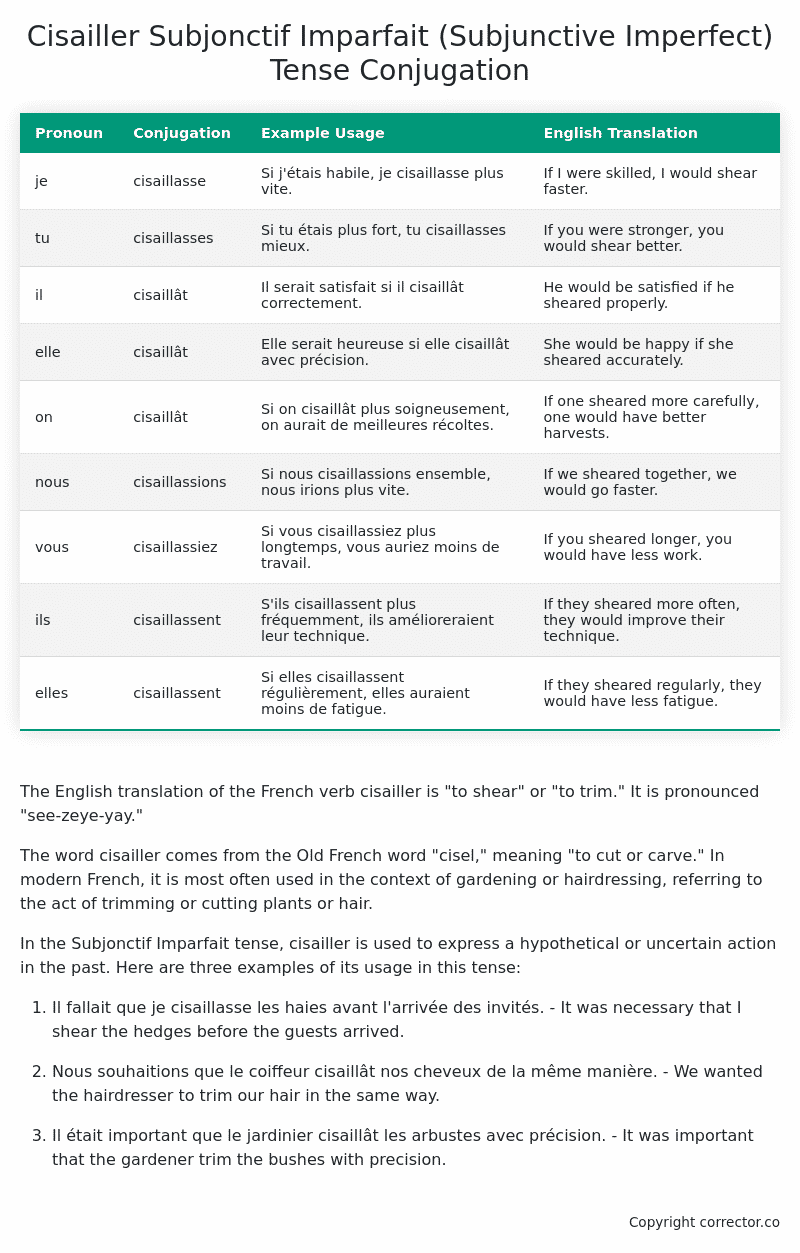Subjonctif Imparfait (Subjunctive Imperfect) Tense Conjugation of the French Verb cisailler
Introduction to the verb cisailler
The English translation of the French verb cisailler is “to shear” or “to trim.” It is pronounced “see-zeye-yay.”
The word cisailler comes from the Old French word “cisel,” meaning “to cut or carve.” In modern French, it is most often used in the context of gardening or hairdressing, referring to the act of trimming or cutting plants or hair.
In the Subjonctif Imparfait tense, cisailler is used to express a hypothetical or uncertain action in the past. Here are three examples of its usage in this tense:
-
Il fallait que je cisaillasse les haies avant l’arrivée des invités. – It was necessary that I shear the hedges before the guests arrived.
-
Nous souhaitions que le coiffeur cisaillât nos cheveux de la même manière. – We wanted the hairdresser to trim our hair in the same way.
-
Il était important que le jardinier cisaillât les arbustes avec précision. – It was important that the gardener trim the bushes with precision.
Table of the Subjonctif Imparfait (Subjunctive Imperfect) Tense Conjugation of cisailler
| Pronoun | Conjugation | Example Usage | English Translation |
|---|---|---|---|
| je | cisaillasse | Si j’étais habile, je cisaillasse plus vite. | If I were skilled, I would shear faster. |
| tu | cisaillasses | Si tu étais plus fort, tu cisaillasses mieux. | If you were stronger, you would shear better. |
| il | cisaillât | Il serait satisfait si il cisaillât correctement. | He would be satisfied if he sheared properly. |
| elle | cisaillât | Elle serait heureuse si elle cisaillât avec précision. | She would be happy if she sheared accurately. |
| on | cisaillât | Si on cisaillât plus soigneusement, on aurait de meilleures récoltes. | If one sheared more carefully, one would have better harvests. |
| nous | cisaillassions | Si nous cisaillassions ensemble, nous irions plus vite. | If we sheared together, we would go faster. |
| vous | cisaillassiez | Si vous cisaillassiez plus longtemps, vous auriez moins de travail. | If you sheared longer, you would have less work. |
| ils | cisaillassent | S’ils cisaillassent plus fréquemment, ils amélioreraient leur technique. | If they sheared more often, they would improve their technique. |
| elles | cisaillassent | Si elles cisaillassent régulièrement, elles auraient moins de fatigue. | If they sheared regularly, they would have less fatigue. |
Other Conjugations for Cisailler.
Le Present (Present Tense) Conjugation of the French Verb cisailler
Imparfait (Imperfect) Tense Conjugation of the French Verb cisailler
Passé Simple (Simple Past) Tense Conjugation of the French Verb cisailler
Passé Composé (Present Perfect) Tense Conjugation of the French Verb cisailler
Futur Simple (Simple Future) Tense Conjugation of the French Verb cisailler
Futur Proche (Near Future) Tense Conjugation of the French Verb cisailler
Plus-que-parfait (Pluperfect) Tense Conjugation of the French Verb cisailler
Passé Antérieur (Past Anterior) Tense Conjugation of the French Verb cisailler
Futur Antérieur (Future Anterior) Tense Conjugation of the French Verb cisailler
Subjonctif Présent (Subjunctive Present) Tense Conjugation of the French Verb cisailler
Subjonctif Passé (Subjunctive Past) Tense Conjugation of the French Verb cisailler
Subjonctif Imparfait (Subjunctive Imperfect) Tense Conjugation of the French Verb cisailler (this article)
Subjonctif Plus-que-parfait (Subjunctive Pluperfect) Tense Conjugation of the French Verb cisailler
Conditionnel Présent (Conditional Present) Tense Conjugation of the French Verb cisailler
Conditionnel Passé (Conditional Past) Tense Conjugation of the French Verb cisailler
L’impératif Présent (Imperative Present) Tense Conjugation of the French Verb cisailler
L’infinitif Présent (Infinitive Present) Tense Conjugation of the French Verb cisailler
Struggling with French verbs or the language in general? Why not use our free French Grammar Checker – no registration required!
Get a FREE Download Study Sheet of this Conjugation 🔥
Simply right click the image below, click “save image” and get your free reference for the cisailler Subjonctif Imparfait tense conjugation!

Cisailler – About the French Subjonctif Imparfait (Subjunctive Imperfect) Tense
Formation
Common Everyday Usage Patterns
Interactions with Other Tenses
Subjonctif Présent
Indicatif Passé Composé
Conditional
Conditional Perfect
Summary
I hope you enjoyed this article on the verb cisailler. Still in a learning mood? Check out another TOTALLY random French verb conjugation!


